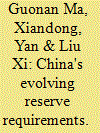|
|
|
Sort Order |
|
|
|
Items / Page
|
|
|
|
|
|
|
| Srl | Item |
| 1 |
ID:
120840


|
|
|
|
|
| Publication |
2013.
|
| Summary/Abstract |
We examine the role of reserve requirements as a cheaper substitute for the open market operations of the People's Bank of China (PBC) to sterilise foreign exchange interventions in recent years. China's reserve requirements have also been used to address a range of other policy objectives, not least macroeconomic management, financial stability and credit policy. The preference for reserve requirements reflects the size of sterilisation and the associated costs, in a quantity-oriented monetary policy framework faced with policy dilemmas. The PBC often finds it easier to make reserve requirement adjustments than interest rate decisions and enjoys greater discretion in applying this tool. The monetary effects of reserve requirements need to be explored not in isolation but in conjunction with other policy actions. Depending on the policy mix, higher reserve requirements tend to signal a tightening bias, to squeeze excess reserves of banks, to push market interest rates higher and to help widen net interest spreads, thus tightening domestic monetary conditions. Reserve requirements, however, impose an implicit tax burden on Chinese banks, albeit the latter seem to pass through a large but incomplete portion of these costs to their customers.
|
|
|
|
|
|
|
|
|
|
|
|
|
|
|
|
| 2 |
ID:
128401


|
|
|
|
|
| Publication |
2014.
|
| Summary/Abstract |
This paper uses the methodology of Parry and Small (2005) to estimate the optimal gasoline tax for a less-developed oil-producing country. The relevance of the estimation relies on the differences between less-developed countries (LDCs) and industrial countries. We argue that lawless roads, general subsidies on gasoline, poor mass transportation systems, older vehicle fleets and unregulated city growth make the tax rates in LDCs differ substantially from the rates in the developed world. We find that the optimal gasoline tax is $1.90 per gallon at 2011 prices and show that the estimate differences are in line with the factors hypothesized. In contrast to the existing literature on industrial countries, we show that the relative gasoline tax incidence may be progressive in Mexico and, more generally, in LDCs.
|
|
|
|
|
|
|
|
|
|
|
|
|
|
|
|
| 3 |
ID:
162935


|
|
|
|
|
| Summary/Abstract |
To investigate the efficacy and efficiency of environmental taxes, I analyze the rate at which taxes on motor gasoline are passed to consumers by estimating two cointegrating vector autoregression models for each of six states. For state models that specify the retail price of motor gasoline without taxes, exclusion tests suggest that taxes on motor gasoline are not passed to consumers on a one-for-one basis. For state models that specify the retail price of motor gasoline including taxes, results indicate that taxes are passed to wholesale prices in Florida and Massachusetts on a one-for-one basis and are passed to retail prices with a ‘mark-up’ in Florida, Massachusetts, New York, and Ohio, and are not fully passed through in Washington. State-specific rates of pass-through differ from results suggested by theory and fixed effects estimators, which may be biased by the presence of nonstationary data and the assumption that the rate of pass through is the same across states. Rates of pass through greater than one transfer $12.2 billion from consumers to retailers in FL, $2.3 billion in MA, and $19.2 billion in NY during the sample period, which represent 10.7%, 6.0%, and 23.9% of total expenditures on regular motor gasoline.
|
|
|
|
|
|
|
|
|
|
|
|
|
|
|
|
| 4 |
ID:
130543


|
|
|
|
|
| Publication |
2014.
|
| Summary/Abstract |
This paper examines whether a casino tax is good for local welfare in a tourism economy. We find that what is important for efficiency is not the tax rate itself but the tax incidence on tourists. Casino tourism in Macao engages in price discrimination via market segmentation. We prove that, compared with the mass market, the VIP market will grow faster with a greater price rise if a tax hike on the VIP market is not large, but will grow less rapidly with a smaller price increase if the tax hike is very large. An empirical study is carried out using data from Macao, which is typical of segmenting markets for discriminatory pricing. We show that our theory is largely consistent with observed evidence. This paper also provides some policy recommendations useful for Macao. We propose that its casino tax should be kept low at its current rate in the mass market but be raised substantially in the VIP market if its economic growth is to be made less unbalanced and more sustainable.
|
|
|
|
|
|
|
|
|
|
|
|
|
|
|
|
|
|
|
|
|